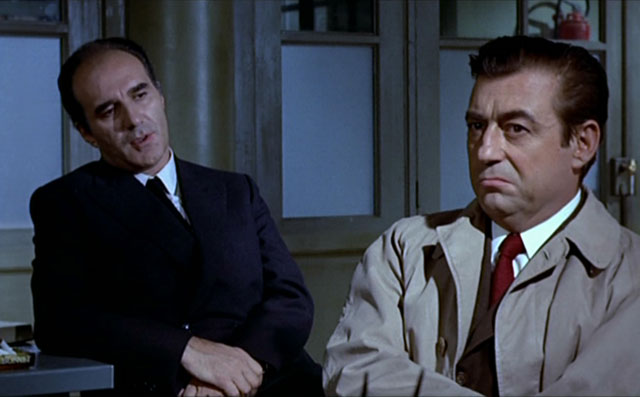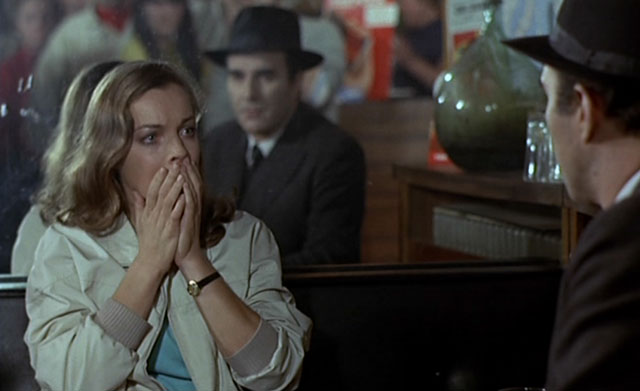“Released in France in 1971, Max et les Ferrailleurs is receiving a belated and welcome American opening at the Elinor Bunin Munroe Film Center, the capstone of a Claude Sautet retrospective,” writes A.O. Scott in the New York Times. “Sautet, a director and screenwriter who died in 2000, is probably best known in this country for Un Coeur en Hiver, his 1992 psychological drama starring Emmanuelle Béart and Daniel Auteuil. But if he is something of a footnote in the history of French cinema—frequently overshadowed by contemporaries like Jean-Pierre Melville and the attention-devouring rebels of the New Wave—Sautet was also an original, a tough and subtle dramatist with a gift for teasing moral complications out of straightforward genre scenarios.”
“In a 1994 interview,” notes Jaime N. Christley in Slant, “Sautet, who had a particular fondness for his Max et les Ferrailleurs, expressed directly and unequivocally his disdain for its protagonist, the police detective Max (Michel Piccoli), an efficient, dedicated policeman with no home life and a hard-won icy exterior. Cops like Max weren’t new in 1971—not in French movies, not in the American thrillers and noirs that inspired the French film industry, not even in Sautet’s work. But like a lady once said about a reporter, you may have met hard-boiled before, but Max, he’s 10 minutes. He’s also independently wealthy. What’s interesting about Sautet’s attitude, calling Max ‘venal,’ ‘twisted,’ and ‘childish,’ is that none of it is apparent in this policier. Sautet’s style is direct and deceptively plain; regarding Max, the film resists judgment, neither condoning nor signposting the despicable nature of his choices.”
Stephen Garrett for Time Out New York: “Loner cop Max (Michel Piccoli), frustrated by his inability to catch crooks red-handed, decides to game the system by tricking a gang of two-bit thieves into robbing a bank—all so he can catch them in the act. The linchpin of his Machiavellian machinations: a simpleminded hooker (Romy Schneider) who hangs with the hooligans and whom Max platonically manipulates into being an unwitting accomplice in his grand plan…. This is a crime thriller that doubles as an impressively jaundiced portrait of self-loathing and misanthropy, and the extent to which a sense of personal justice, however highly developed or refined, can decimate basic decency.”
Noting that Max appeared in the same year as Dirty Harry and The French Connection, Michael Atkinson writes in the Voice: “Its own kind of anti-heist film, Sautet’s low-boiler treats Piccoli’s peculiar, primly dressed protagonist as a cipher, until we’re given cause to wonder if he’s insane, a turning point hardly substantiated by the otherwise vague screenplay.”
“Sautet—perhaps best known in this country for smooth ensemble pieces like Vincent, Paul, François and the Others—was also working in the aftermath of the student uprising in May 1968,” adds Daniel Eagan in Film Journal International, “so his film emphasizes the generational divide between middle-aged, mostly disillusioned cops in suits and ties and the long-haired hoodlums in jeans and leather jackets they are fighting. Sautet’s policemen worry that they are losing control, the same fear that drove American characters like Dirty Harry and Popeye Doyle.”
Benjamin Mercer in the L: “Sautet shows Abel and his in-over-their-heads accomplices (some of whom are ‘not quite all there,’ according to one detective) enjoying carefree communal life in a suburban café, before the cop sets his predatory-justice scheme in motion. Crushingly, Max et les Ferrailleurs makes plain that the folly belongs to everyone.”
For news and tips throughout the day every day, follow @KeyframeDaily on Twitter and/or the RSS feed. Get Keyframe Daily in your inbox by signing in at fandor.com/daily.





